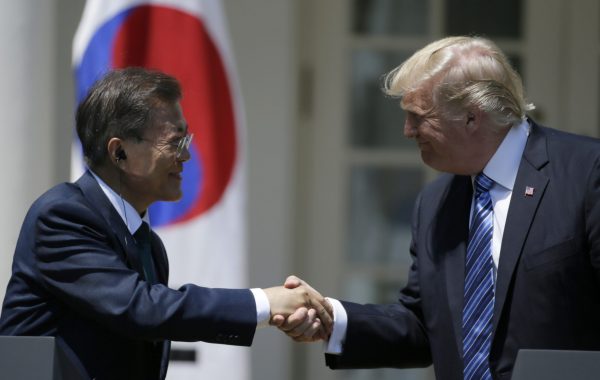The Bush–Kim summit in March 2001 notably failed to get US buy-in to Kim’s Sunshine Policy, and some analysts cite that shortcoming as setting up each administration for difficulties not only in developing a coordinated strategy for North Korea, but also in managing the alliance as a whole.
There were two main pillars to the partnership that needed a positive outcome from the presidential summit — economics and security.
The economic leg of the trip hit some bumpy patches of road. The joint statement briefly addressed mutual commitment to ‘foster expanded and balanced trade while creating reciprocal benefits and fair treatment’.
South Korea had put in the groundwork to signal investment in the United States. Ahead of the summit, the South Korean behemoth Samsung announced it would open a manufacturing plant in South Carolina to shift some production from Mexico — an investment that Samsung Electronics America President and CEO Tim Baxter said would demonstrate that ‘Samsung is reaffirming its commitment to expanding its US operations and deepening our connection to the American consumers, engineers and innovators’.
Unfortunately for Moon, cracks emerged during their joint press appearance. One of the central goals of Trump’s presidential platform includes slashing ‘bad deals’, and he has often cited the Korea–US Free Trade Agreement (KORUS FTA) as one of the most ‘horrible’. Trump focused on the trade deficit and suggested South Korea was dumping steel and cars in the United States, while blocking US goods from being competitive in the South Korean market. Moon later suggested ‘the US Commerce Department’s own analytical data can attest’ that the FTA shows a deficit in goods for the United States, but a deficit in services for South Korea.
On Wednesday this week the US Trade Representative Robert Lighthizer announced he would convene the KORUS FTA joint committee to renegotiate amendments to the trade deal. A South Korean trade ministry official said they would meet to ‘discuss mutual interests and concerns’, but indicated to Reuters that Seoul’s ‘stance is that we have not agreed on renegotiation of the deal’.
On the plus side, the two sides produced a common front vis-à-vis North Korean security concerns. Given each president’s remarks on North Korea — including during each of their presidential campaigns in the past year — there was a risk of divergence over North Korea. The North Korea issue is central for setting the tone of the bilateral relationship.
The Trump administration has laid out its North Korea policy as ‘maximum pressure and engagement’. Secretary of State Rex Tillerson in March 2017 said that ‘all options are on the table’ and that the ‘policy of strategic patience has ended’ in dealing with North Korea, suggesting a harder line approach than the Obama administration. In contrast, the Moon administration continues to see talks with North Korea as inherently valuable and has indicated that it will seek avenues for humanitarian exchange with Pyongyang.
Parsing the summit’s joint statement, it is evident both administrations sought to alleviate some of each other’s concerns. While remarks earlier in Trump’s campaign made some South Koreans fear abandonment of their strong security partner, the joint statement underscored US commitment to extended nuclear deterrence and the importance of regular military dialogue between the two nations.
For US interests that want South Korea to play a greater role in the alliance militarily, the joint statement signalled continued efforts for wartime transfer of operational control to South Korea. It also suggested South Korea will increase development of its own military capabilities to counter North Korea’s emerging nuclear and missile program.
Despite any possible divergence in the balance of engagement and isolation towards North Korea, the joint statement stressed the importance of pressure to dissuade North Korea from ‘provocative, destabilising actions and rhetoric’. It also affirmed that the alliance policy towards North Korea — which the joint statement takes efforts to note is ‘not a hostile’ one — would keep the door to dialogue with North Korea ‘open under the right circumstances’.
This outcome echoes analyses suggesting President Moon would be much more of a pragmatist than idealist in his approach toward Pyongyang. On 6 July while in Germany for a G20 summit, Moon called for more family reunions for Koreans separated by the war despite North Korea’s first test of an intercontinental ballistic missile, and called on North Korea to move away from provocative acts in order to pursue a path of dialogue and reconciliation. Moon reiterated his administration’s commitment to improving inter-Korean relations through restarting dialogue, a bid which has yet to be accepted by Pyongyang.
But Moon has also said that ‘dialogue is possible only when North Korea changes its behaviour’, and suggested the need to develop and deploy an indigenous missile defence system, in addition to or instead of the Terminal High Altitude Area Defence (THAAD) system.
Going forward, coordination between the two allies might thoughtfully leverage the two approaches. The United States has the capability and position to selectively and strongly apply pressure to North Korea via diplomacy and sanctions, and South Korea does indeed have a privileged role in working with the North. A consistent message that explicitly indicates an alliance approach with different roles for each of the partners is unlikely to send the wrong message to either Pyongyang or Beijing.
Darcie Draudt is a PhD student in Political Science at the Johns Hopkins University, a non-resident James A. Kelly Korean Studies fellow at Pacific Forum CSIS, and director of research at Sino–NK.

